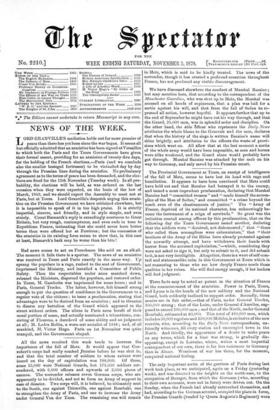The Provincial Government at Tours, on receipt of intelligence of
the fall of Metz, seems to have lost its head with rage and humiliation. It appears to have been convinced that Metz could have held out and that Bazaine had betrayed it to the enemy, and issued a most imprudent proclamation, declaring that Marshal Bazaine had "committed treason" and "made himself the accom- plice of the Man of Sedan," and committed "a crime beyond the reach even of the chastisements of justice." The "Army of France, deprived of its national character, has unknowingly be- come the instrument of a reign of servitude." So great was the irritation created among officers by this proclamation, that on the following day the Tours Government issued another, declaring that the soldiers were "deceived, not dishonoured ;" that "those who called them accomplices were calumniators," that "their brothers of the Army of the Rhine have already protested against the cowardly attempt, and have withdrawn their hands with horror from the accursed capitulation,"—which, considering they were not asked to sign it, but only to submit to it, and did submit to it, is not very intelligible. Altogether, there is a want of self-con- trol and statesmanlike calm in this Government at Tours which is not reassuring to those who see how deeply France needs those qualities in her rulers. She will find energy enough, if her leaders will find judgment.


































